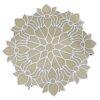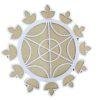Are you ready to celebrate November with the powerful Serpent Gods? Nagula Chavithi is one of the most important festivals in South India, and people show great dedication and respect for it. The festival, which will happen on November 5, 2024, is significant to many people. Married women celebrate it to ensure their kids are healthy and happy. Some believe praying to the Nag Devatas (Serpent Gods) on this day will keep them safe and bring them happiness. Let’s learn more about this holy day’s history, its customs, and what it means.
Key Reasons for Nagula Chavithi
The holy month of Karthika Masam ends on the fourth day after Deepavali, which is Amavasya. This is Nagula Chavithi. Hindu legend gives the Nag Devatas much power and links them to safety, fertility, and power. They are going to church today. Festival most people are from Andhra Pradesh and some in Karnataka.
People do this because they think that snakes are holy and that worshipping them can keep their families safe, especially their children. At this time, women fast, pray, and perform special poojas to ask the snake gods to give their loved ones health, wealth, and a long life.
Nagula Chavithi in 2024

For any puja to work, knowing the exact times and good times is essential. These times are essential for Nagula Chavithi in 2024 and is for Dubai:
- The Nagula Chavithi Puja takes place from 10:56 a.m. to 1:09 p.m. on Tuesday, 5th November, 2024
- It’s about two hours and thirteen minutes long.
- Chavithi Tithi begins at 09:54 p.m. on November 4, 2024.
- The Chavithi Tithi is over on November 5, 2024, at 10:46 p.m.
These are the best times to enjoy the festival because the Nag Devatas will bless those who do.
Spiritual value of snakes
Snakes have always been critical in Hinduism. Folks believe they protect wealth, fertility, and knowledge and connect them to many gods. Some people think that Nag Devatas are potent gods who can bless or curse people based on how much love they get.
Some of the most worshipped snake gods are Ananta, Vasuki, and Shesha, all known from essential myths. In the Samudra Manthan, Vasuki was essential because he made the water move. On Nagula Chavithi, some people pray to these gods to protect their families from snakebites, sickness, and other bad luck.
Nagula Chavithi’s Rituals and Practices

Nagula Chavithi does many essential things to get the gifts of the snake gods. There are a lot of married women who fast and pray on this day. Here is a list of the most essential customs:
Snake Worship: People bring milk, turmeric, flowers, and food to snake pits and other places where snakes are common.
Fasting: Women don’t eat or drink during the day or break their fast until after the pooja. Some people believe that this fast strengthens their wishes for the health of their children.
Thanking and praying: As part of a special pooja, people pray to the Nag Devatas, especially the twelve main snake gods.
Gods: The gods include Kambala, Karnataka, Ashvatara, Dhritarashtra, Shankhapala, Kaliya, and Takshaka.
Why does Nagula Chavithi fasting matter?
Going without food is a big part of Nagula Chavithi. Married women fast with all their hearts because they think it will keep their children safe and help them live long healthy lives. People usually break their fast after the pooja and eat only light, vegetarian food.
Many people believe that fasting cleans the body and soul and brings a person in line with spiritual forces. They think that keeping this fast makes the Nag Devatas happy. When they are so glad, they protect the family and give them wealth.
The Nag Devatas’ Hindu role
Not only do Nag Devatas protect people, but they also protect wealth and nature. Many Hindu books use snakes to show rebirth, change, and the endlessness of life. During Nagula Chavithi, married women pray for their families and children’s health and happiness. This is a significant time to connect snakes with fertility.
One popular belief is that Vasuki, the king of snakes, is powerful, and Ananta, the endless, shows that the world will always be there. He wears the world on his hoods to show strength and stability. Many people honour all of these gods at the event.
The South Indian Nagula Chavithi
The way people in different parts of the world celebrate Nagula Chavithi is slightly different. People in Andhra Pradesh and some parts of Karnataka know about the event the best. Andhra Pradesh has events where people get together near snake pits. On the other hand, people can pray at shrines dedicated to Nag Devatas in Karnataka.
The spirit of the festival is the same everywhere people respect snakes a lot and believe their blessings will bring them wealth and safety.
Nagurla Chavithi’s warnings and beliefs
Some people believe that you shouldn’t dig or cause trouble for snakes on the day of Nagula Chavithi. There is a belief that doing so could anger the Nag Devatas and cause bad luck.
Also, people were warned to be careful with the gifts and not mess up places where snakes live. The ceremonies show how much people respect and fear these powerful gods.
The Importance of Nagula Chavithi Nowadays
Even though it comes from old traditions, following Nagula Chavithi is still essential today. As time goes on, people lose touch with nature. The event helps us remember the fragile balance between us and nature. An example of this is snake worship, which shows people how to treat all living things respectfully and get along with them.
For many, Nagula Chavithi is more than just a religious festival. It’s also a chance to spend time with family, nature, and spiritual practices passed down from generation to generation.
Conclusion
There are still many traditions and deep cultural meanings that make Nagula Chavithi a very important festival in South India. People believe praying to the Nag Devatas on this day will protect families, especially children, and bring them good luck and wealth. When followers get together on November 5, 2024, the tradition will continue to show how powerful faith can be, how important it is to take care of nature, and how the holy serpent gods can bless us.


















Add comment